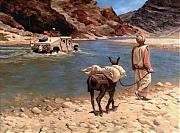The battle lines may be clearer in Washington than in Iraq. A Democratic-controlled Congress wants to set a timetable for U.S. combat troops to get out of a fight the American public no longer supports. When he meets with congressional leaders this week, President George W. Bush will vow again to veto any such bill. And like the president, Republican Sen. John McCain—decorated veteran, presidential hopeful and stubborn supporter of the U.S. troop surge in Baghdad—warns of apocalyptic consequences if there's a pullout.
"This is an historic choice, with ramifications for Americans not even born yet," McCain recently told students at Virginia Military Institute who were about to graduate from gray cadet uniforms to desert camouflage. A premature U.S. withdrawal would create "a Wild West for terrorists" who believe "we Americans are their ultimate target." For the Iraqis, warned McCain, a U.S. pullout would lead to "genocide" in which "we would be complicit."
He could well be right. In the Middle East, aid workers, regional leaders, Iraqi officials and ordinary civilians agree that if the Americans leave quickly, Iraq's disastrous condition could be made much worse. They warn of a massive flood of refugees heading for the borders, of massacres as Sunnis and Shiites cross paths, of a proxy war funded by Iran and Saudi Arabia within Iraq itself. "The consequences of [this] not working out are catastrophic," says an aid worker overseeing part of the U.N. relief effort in Iraq, who doesn't want to make any comment on the record that might sound political.
That's why the White House is asking for more time. The surge of more than 20,000 additional American troops that Bush announced earlier this year now looks to total well over 30,000, in addition to the 134,000 already in the country. To meet those numbers, Defense Secretary Robert Gates said last week that the tours of many soldiers in Iraq would be extended. The idea is not that the troops will be able to end the insurgency quickly, but for them to tamp down the violence long enough for rebuilding and political reconciliation to take root. "This is a marathon, not a sprint," says David Kilcullen, a counterinsurgency specialist who is part of the team pulled together by Gen. David Petraeus, the U.S. commander in Iraq...







Bookmarks